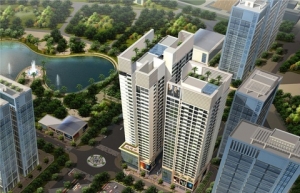INTERNATIONAL INVESTMENT
AND PORTAL
For seven years, the Law on Housing has allowed foreigners to buy houses in Vietnam. However, many overlapping and conflicting regulations are causing confusion among sellers, buyers, and even brokers.
Vietnam is one of Southeast Asia’s premier emerging markets and a global property hotspot. Despite unprecedented global events, Vietnam has been resilient, with GDP growth in 2022 forecast at 7.5 per cent. The country outranks most in terms of global growth.
 Matthew Powell - Director, Savills Hanoi
Matthew Powell - Director, Savills Hanoi
A good economic performance and updated land laws have supported demand and interest from foreign buyers who want to own property in Vietnam. The involvement of reputable international developers in Vietnam has encouraged foreign interest because it provides increased confidence and security for buyers.
International buyers prefer Grade A or high-end properties that meet their quality and service requirements. Often, these projects come from reputable developers with strong track records. Foreign buyers also like projects with good rental yields or opportunities for capital gains.
While there is foreign interest, international buyers are limited to the number of units they can buy within a specific project or ward. They can only buy 30 per cent of the apartment units in a single development or 10 per cent within villa complexes.
This quota in villa projects is taken up almost immediately, especially at luxury resorts. There is still slow progress for residential projects in Vietnam to be formally approved for sale to foreign purchasers. Rules are still opaque, and not clear on the criteria and requirements for selecting projects that can sell residential units to foreigners.
Vietnam could adjust the quota based on location and product type to simplify the process and boost foreign interest.
The current policy is to safeguard locals and to ensure they can still buy property in the city or residential areas. The 30 per cent quota on apartment ownership and 250 landed properties in one administrative ward can be kept in residential areas, especially in big cities.
However, for luxury resort projects, this can be increased from 10 per cent to support foreign interest in the market. This is because the luxury segment does not affect the social fabric of cities. Boosting the quota for luxury projects will attract more diverse buyers while ensuring local people still have access to real estate. A hindrance is that buyers could struggle to obtain the appropriate long-term visa after they purchase a property here.
Thailand and Malaysia have been very successful in developing sustainable markets for foreigners. Malaysia has a scheme called My Second Home, which actively attracts wealthy foreign retirees. It has been very successful, with many applicants from the United States, Hong Kong, and the United Kingdom. Often, these individuals can retire in Malaysia and have the security of a visa and the comfort of tax incentives. Retirement visas and attractive policies for foreigners to own properties can generate significant revenue.
Foreign buyers are often unfamiliar with local laws and legal procedures, and many local administrations are not equipped to deal with foreigners. This is why international buyers should work with a reputable consulting firm, which will ensure security and transparency in the process. These consultants will also be able to identify properties that would meet the investor’s requirements when it comes to budget, location, and facilities.
 Eight more housing projects in Hanoi can be owned by foreigners
Eight more housing projects in Hanoi can be owned by foreigners
Hanoi’s Department of Construction recently announced foreign organisations and individuals can now own eight more housing projects.
By Matthew Powell



















